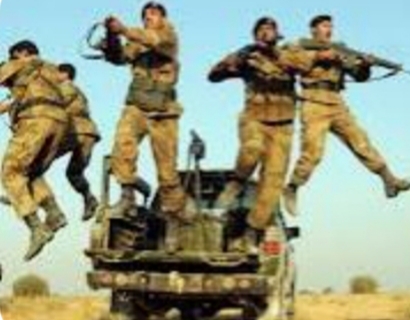- Advertisement -
PESHAWAR, Apr 09 (APP):Whether during wartime or in intelligence-based operations against terrorism, the Pakistan Armed Forces have consistently demonstrated unmatched bravery, thwarting the malicious designs of adversarial forces.
From the rugged mountains of the erstwhile FATA on the Pakistan-Afghanistan border to the lofty terrains of the Line of Control (LoC) in Kashmir, Pakistani soldiers have steadfastly protected the country from all security threats.
Numerous brave soldiers including Captain Muhammad Sarwar Shaheed (NH), Major Muhammad Tufail Shaheed (NH), Pilot Offcer Rashid Minhas Shaheed (NH), Major Aziz Bhattai Shaheed (NH), Hawaldar Lalak Jan Shaheed (NH) and Captain Karnal Sher Khan Shaheed (NH) besides many other troops have sacrificed their lives in defense of the motherland.
Captain Muhammad Iqbal Khan Shaheed (Hilal-e-Juraat) was one such brave officer of Pakistan Army, who embraced martyrdom on September 25, 1987, in the world’s highest battle zone, Siachen Glaciers, adding a golden chapter of gallantry in the annals of Pakistan Army.
“Death is inevitable. One can die in a road accident or endure the last agonizing moments on a Charpoy (bed), but I want to face death and look it in the eye like a true warrior,” the 27-year-old young officer, who remained unmarried, said to his friends and relatives just two months before his martdyom at the world highest battle zone.
Born in Pashtoon Garhi, Nowshera district of Khyber Pakthunkhwa, on November 15, 1960 at the residence of Haji Mir Ahmad Khan, Captain Iqbal received commission in the Pakistan Army’s ASC in 1982.
Faced the enemy in the Siachen glaciers, situated at over 21,000 feet above sea level, Captain Iqbal has not only fought against the Indian Army with great gallantry but also withstood the harsh, unforgiving weather with steadfastness.
His unshakable resolve and heroic battlefield performance in such extreme conditions earned him great admiration and respect and was awarded second highest award of Hilal Jurat (HJ) by Pakistan.
Shams Khan, the younger brother of Captain Iqbal (HJ) Shaheed, spoke with pride about his brother’s character. “He was pious and a man of excellent moral values. Whenever he came home, he would hug Shabbar, our servant, without any regard for his clothes or status. To him, every person was equal,” Shams recalled.
Two months before his martyrdom, Captain Iqbal wrote a famous will, which he handed over to his childhood friend, Ghayasuddin, with instructions not to reveal it until after his death. The will, written in simple yet profound words, reflected his great values. It read, “I owe 16 days of fasting and took a bank loan of Rs. 900 from a fund reserved for science students. The necessary details are available in the administration block of Peshawar University. This amount should be paid back.”
He further instructed, “My grave should remain unplastered and should be as modest as Islamic law allows. No flowers, no sehra, no dupatta should be placed on my grave, as such rituals contradict Islamic teachings. Prayer is the real thing. There should be no gatherings, no cooking of rice, or almsgiving during my chehlum or any such occasion. Instead, any money received after my death should be spent on useful purposes, such as paving a street, building a drain, or donating to a mosque. This would be a continuing charity.”
Captain Iqbal’s will also emphasized the importance of charity, stating, “If the amount received from the government after my death exceeds Rs. 50,000, Rs. 40,000 should be distributed among the poor as atonement for the prayers I could not offer and the fasts I could not keep.”
He further added, “I request my family not to perform any un-Islamic rituals after my death. If anyone wishes to honour me, let them recite Darood Sharif for the Prophet Muhammad (PBUH) frequently and pray for my soul.”
In his final letter to his friend Ghayasuddin on August 23, 1987, Captain Iqbal asked for prayers for his health and courage to serve Islam, and the strength to face death with dignity, whether as a victorious Ghazi or a martyr.
Captain Iqbal Shaheed’s courage and motivation were unwavering and battlefield action was a role model for young army officers.
According to his brother, “He was a true Momin, and for him, death was not a fearful end, but an honorable passage.”
The visitors while travelling to Noeshera through Pashtun Ghari observe that there are no epitaph, no flowers, and no extravagant rituals on his grave and are offering Fateha for his eternal peace.
Captain Iqbal Shaheed was a brave Officer of Pakistan Army who embraced martdyom after receiving artillery shells and his body was later recovered after several months from Siachen. He was laid to rest in his native village with full military honour.

